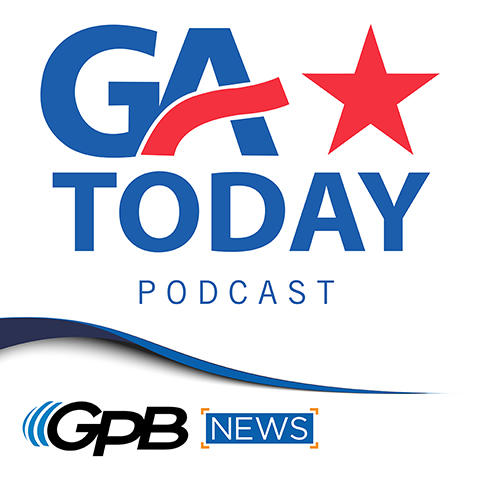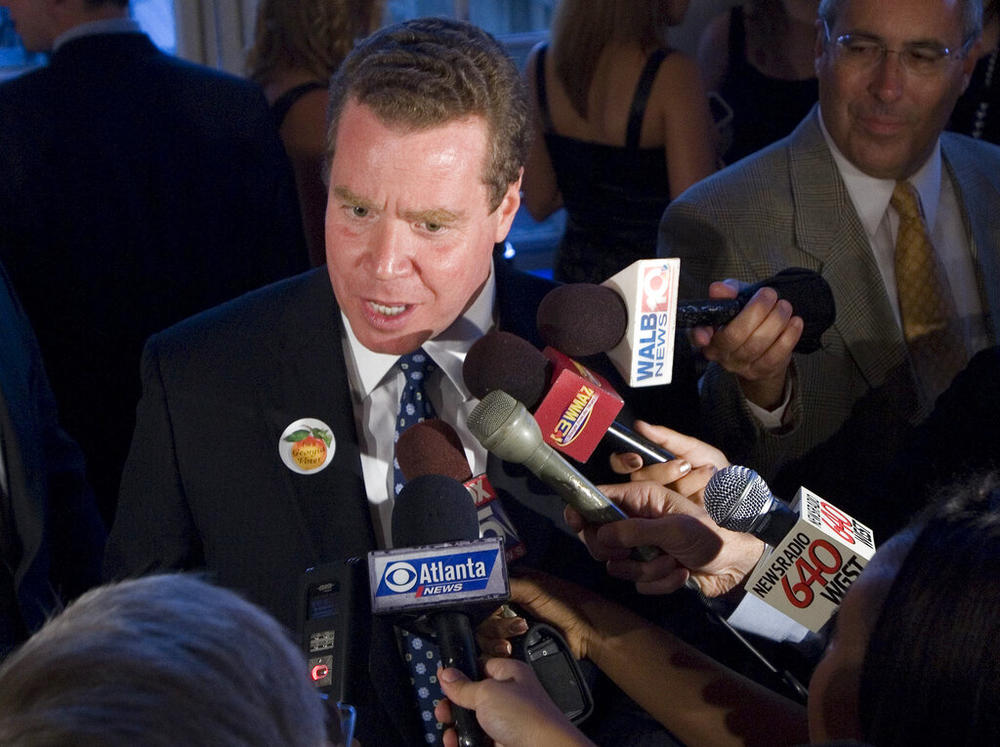
Section Branding
Header Content
Georgia Today: Rep. Greene files to oust Speaker Johnson; Raffensperger on USPS delays and voting
Primary Content
LISTEN: On the Friday, March 22 edition of Georgia Today: Rep. Marjorie Taylor Greene files a motion to oust U.S. House Speaker Mike Johnson, the former Georgia insurance commissioner pleads guilty in health care fraud scheme; and Secretary of State Brad Raffensperger speaks with us about U.S. Postal Service delays and their affects on absentee voting.

Orlando Montoya: Hello and welcome to the Georgia Today podcast from GPB News. Today is Friday, March 22. I'm Orlando Montoya. On today's episode, one of Georgia's most outspoken members of Congress has filed a motion to oust U.S. House speaker Mike Johnson. A former Georgia insurance commissioner has pleaded guilty in a federal case accusing him of taking part in a health care fraud scheme. And Secretary of State Brad Raffensperger speaks with us about U.S. Postal Service delays and their effects on absentee voting. These stories and more are coming up on this edition of Georgia Today.
Story 1:
Orlando Montoya: Rome congresswoman Marjorie Taylor Greene has filed a motion to oust U.S. House speaker Mike Johnson. The move comes just months after Johnson's predecessor was removed in a far-right conservative revolt. The House is scheduled to break for its spring recess today, and it's doubtful a vote to remove Johnson would be imminent.

Story 2:
Orlando Montoya: Former Georgia Insurance Commissioner John Oxendine has pleaded guilty in a federal case accusing him of taking part in a health care fraud scheme. The U.S. Justice Department says Oxendine pleaded guilty today to one count of conspiracy to commit health care fraud. He's agreed to pay restitution of nearly $700,000 as part of the plea agreement. He was due to stand trial on fraud and money laundering charges. A federal judge had rejected Oxendine to dismiss the criminal charges and set an April 15 trial date. He faces up to a decade in prison. His sentencing has been set for July 12, and he remains free on bond until then.
Story 3:
Orlando Montoya: A January 6th defendant who at the time of the insurrection was a Savannah car salesman is showing interest in taking his case to trial. GPB's Benjamin Payne reports.
Benjamin Payne: The vast majority of January 6 defendants have played out. Rather than take their chances before a jury and risk a stiffer sentence. Dominic Box has now signaled he may go that riskier route. The 34-year-old pleaded not guilty Thursday to recently upgraded federal charges for his alleged role in the attack on the U.S. Capitol by supporters of then-President Donald Trump. Official minutes from the arraignment went on to state that Box, quote "has indicated that he may be interested in proceeding to a stipulated trial," unquote. A stipulated trial is one which both the prosecution and the defense agree beforehand to certain facts, so they don't need to be argued in court. Fox was offered a plea deal last year by prosecutors, which he initially agreed to before backing out. A federal judge has not yet set a trial date, but the parties did discuss the possibility of holding one in June. For GPB News, I'm Benjamin Payne in Savannah.
Story 4:
Orlando Montoya: The first brewery in Augusta since prohibition will close after this year's Masters Tournament. River Watch Brewery opened in 2016. They'd been looking to grow in an affordable new location with enough space and foot traffic since 2019. Unable to find such a location and struggling in their current one, the brewery's owner says the last day for River Watch will be April 19.
Story 5:
Orlando Montoya: Turning now to the state capitol, the state Senate has pushed through two bills aimed at forcing local governments to help deport immigrants instead of sheltering them. It's part of a political response to a student's murder at the University of Georgia, allegedly by a Venezuelan man who was in the country illegally. GPB's Sarah Kallis has more.
Sarah Kallis: House Bill 301 will punish city and county governments that don't cooperate with immigration officials, according to Sen. Randy Robertson.
Randy Robertson: If you go out there and you want to be a sanctuary city that violates Georgia law, then you're going to be held accountable for that.
Sarah Kallis: Democrats like Sen. Josh McLaurin objected, claiming the new law could cause expensive legal problems.
Josh McLaurin: What this bill does is elevate a sanctuary policy or practice as a policy issue to the same level that this state treats felony convictions.
Sarah Kallis: The bill passed 33 to 18. Along the same lines, HB 1105 would make it mandatory for law enforcement to check a person's immigration status when they are detained, and pass that information along to federal immigration authorities. The bill passed 34 to 19. Both bills need final approval from the House. For GPB News, I'm Sarah Kallis.
Story 6:
Orlando Montoya: The Biden administration has announced an additional $6 billion in student loan forgiveness for public service workers through the Public Service Loan Forgiveness Program. Yesterday's announcement is the latest from the administration to lower or cancel student debt. Karibo Jackson, a member of President Biden's Council of Economic Advisers, says nearly 36,000 Georgia public sector workers with more than $3 billion in student loan debt have been approved for forgiveness under the program since 2021.
Karibo Jackson: These are teachers, nurses, firefighters and more. Those who have gone into public service, they're getting their loans forgiven already.
Orlando Montoya: The nearly 80,000 borrowers eligible for relief announced yesterday will get an email from the president next week.

Story 7:
Orlando Montoya: The U.S. Postal Service says its local managers are aware of concerns that some Georgians have over mail delays and reports of undelivered mail, with a general primary coming up on May 21. March 4 was the first date that voters could request an absentee ballot for the primary, and requests must be returned by May 10. Absentee ballots must be received by county boards of registrars by 7 p.m. on election day for the general primary, May 21. The secretary of state's office estimates about one-third of Georgia's 7 million active voters will participate, and there's some worry that those USPS delays could cause issues with absentee voting. Secretary of State Brad Raffensperger joined GPB's Morning Edition host Pamela Kirkland to share his thoughts about the problem and what actions voters should take to minimize delays.
Pamela Kirkland: Secretary Raffensperger, what should voters plan on doing to avoid their ballots getting caught up in this mail mess and these USPS delays that we're seeing.
Brad Raffensperger: First of all, we have a cutoff period. Make sure you request your absentee ballot, you know, with — within that window of time. But we also have a program called Ballot Trax. That's T-R-A-X. And I would encourage everyone to sign up. It's free, but you can actually track your absentee ballot through the process. So what you would see is, when the county receives it, they check it off and you see what that date is. Then you'll see when the county sends back and say, "Oh, they sent it back the next day’"or two days later, whatever that is. But then you'll know that's when it went out. And if you haven't seen your absentee ballot, you know, back at your house, in your mailbox, say, in three to five days, you can start asking, what happened to it? You know, I would think seven [days] at the absolute most. It depends where you are. You know what your typical mail service is, and you can call your local post office.
But what we are seeing right now — this has happened in a few counties. So, we've done the back office check: When did the voter actually request the ballot? Did they do it within the — within the requirements of law? Yes, they did. When did the counties get it and when did they turn it around? They hit all those numbers, too. So the issue is not the county or the voter. It's actually the United States Postal Service. So what the voters can do next is call their congressman, call their U.S. senator, and call 1600 Pennsylvania Avenue and ask them to fix the United States Postal Service. We have to get this fixed. We have the May general primaries coming up.
And then in November, we're going to have well north of 5 million voters coming out. We had 5 million voters that voted. Now we are back to about 6% [absentee], but 6% of 5 million? That's still 300,000 people that are voting absentee. We need to make sure that the United States Postal Service does their job and gets those ballots back to voters, and they all should know that they can get their ballot back in. So it's the request, and it's also the ballot process, because once the ballot goes back in, then they actually record — the county records that they got it.
And if you have any questions about the county actually getting it, because that's the other thing, you're waiting for your application. Obviously that goes into the ballots going through the system, but you want to make sure that the county's marked off that it actually arrived. What if it hasn't arrived to them? You — it doesn't get to you, but what if it doesn't get back to them? So you had it on both sides of the equation there. So, you can always drop that off at the county, but many times you're voting absentee ... because you don't have mobility there or whatever reason. But that may be something you have to work around if the Postal Service does not get its act together. So I'd say call your congressman, your U.S. senator and call 1600 Pennsylvania Avenue.
Pamela Kirkland: Voters are facing reduced ballot drop box access after SB 202 was signed into law after the last presidential cycle. So if drop box usage is being encouraged as an alternative to returning ballots by mail, what would you say to those voters who are facing either restricted access, or perhaps now have just a longer drive to find a ballot drop box that they can return their absentee ballot?
Brad Raffensperger: Well, during 2020, we had a huge upswing of the absentee ballots. We were probably pushing 30% to 35% for some of the some of the elections that we had over that cycle. But if you look at the 2022 [cycle], we're back to about 6%. That's a historical number. So that's really what we're expecting. We'll actually get a better feel for that when we see the May general primary and how many people, what percentage, vote that way.
But also what the General Assembly worked on SB 202: They wanted to have, you know, something that made some, you know, logical sense. And one is to make sure that every county had one. During 2020, there was about 30 to 40 counties that did not have a single absentee ballot drop box. So now all 159 counties have to have at least one drop box, and every county gets one per 100,000 voters. So the bigger counties will have more, and smaller counties will have one. And if you live in a county under 100,000, that'll probably be at your county election office.
Pamela Kirkland: Yeah. And process-wise, I mean, ... are there are there any concrete steps that your office can take on this issue? For example, is there something like a constitutional officer that could be put into place?
Brad Raffensperger: Now that the law is the law and the General Assembly has a few laws that they're working through right now: legislation to update some of the elections code. No. 1 that they're working on really is concerned in making sure that there's no foreign funding of state elections. There's a federal prohibition on federal elections, but there's no prohibition for state elections. And we think that needs to be put in place, because with Biden's open border policy, people are really concerned about out-of-control illegal immigration. But that — the corollary, or what goes along with that, is people are concerned about noncitizen voting.
So we want to make sure there isn't foreign funding. We also want to make sure there's not foreign lobbyists that are working for an organization, and they're not registered with the state. We want to look at closing that loophole. So we're working on that. We also believe that we should have a constitutional amendment. We'll have to work on that next session because it won't be passing this session. Because right now we're being sued by organizations like the New Georgia Project, which was founded by Stacey Abrams, and the Coalition for the People's Agenda. There's a lawsuit to stop us from doing citizenship verification before you put people on the voter rolls. Well, right now we know that we don't have noncitizens on the voting roll because we're catching them through the Department of Driver's Service's, you know, process of verification. It's a good process. It's a fair process. It's ensuring that we only have American citizens on the voter rolls.
Pamela Kirkland: How many noncitizens has your office found on the voter rolls?
Brad Raffensperger: We have found they were never — the answer, actually the best, to our recollection, is zero. But we found 1,632 that attempted to register, and then they were in the holding bin until these people could prove that they actually had, somehow naturalized. So we went through the same data that and the federal records that they also have for immigration to just try and verify that between about 1,600 that attempted to register. And then that's why we believe it's really good that the process we have with the Department of Driver's Services, and now we're being sued to stop that, and that would have been 1,600 people that would be put on the voter rolls. That's 1,600 people that then potentially could have voted. And that really could cause severe hardship to those folks because when they go for their citizenship, you know, final review, if they ever vote in an election, it actually could nullify their ability to ever become an American citizen. But also, it diminishes the value, the priceless franchise of citizenship and the ability to be the only people that voted in Georgia are American citizens. And that really should be nationwide.
Pamela Kirkland: What should voters do if they request an absentee ballot, but they don't receive it?
Brad Raffensperger: I think, call the county to ask them if they're having any issues. Say, "Did you receive it?" And then — and if you did Ballot Trax, you would know if they've actually sent, they've received it, your application and all that. That would help an awful lot. But call the counties and ask them if they received it. And if they say, "yes, we have," [then ask] "Did you sent it back out?" "Yes we have." And then "When did you send it out?" And then find out was it three days or was actually three weeks. And then you have to look at when is — when's the next day — when is voting day approaching? You may have to show up in person. Hopefully you still have a few days of early voting left so you can kind of pick your schedule. Otherwise you'd have to show up on Tuesday. If you do show up on Tuesday and on Election Day, by law, lines have to be shorter than one hour. That's been really positive. The counties are doing a great job of meeting that.
Pamela Kirkland: And hopefully these delays are resolved before — well before we get to the general election.
Brad Raffensperger: Absolutely.
Pamela Kirkland: It's not the first time —
Brad Raffensperger: That's why we're shining a —
Pamela Kirkland: Sorry, go ahead.
Brad Raffensperger: That's why we're shining a light on the United States Postal Service, because that's something that's a federal responsibility. And they need to live up to their responsibility and their duty to make sure that people get their mail on time — and definitely people get their ballots on time.
Pamela Kirkland: So I wanted to ask because it's not the first time there have been concerns around mail-in ballots. Do you worry that issues like this, what we're seeing with these mail delays, makes people worry about the process of counting absentee votes, and fosters a lack of trust in the system?
Brad Raffensperger: It's really important for every, you know, wheel in the cog is always — every cog in the wheel is always working. Because as soon as one cog doesn't, all of a sudden you have slippage in the system. And we want to make sure that it's really tight. So we tell the feds to tighten up and get it right, because if they do that, then that's one area — because we know that the counties have done a good job. We've done the check-up of what these allegations were made, what happened. So we've gone back, and we checked the counties. They're doing their work. The voters did their work. The feds have dropped the ball. And so that's really something that hurts confidence. And confidence builds trust. And trust is the new gold standard.
Pamela Kirkland: Secretary, what can you tell us about how votes are going to be counted and how quickly those voting results are going to be made visible to the public this time around?
Brad Raffensperger: Well, we actually are working on a bill right now. We intend to — we're praying that we get it over on Day 40. But that looks like it's going to get favorable airing and I think it will have bipartisan support. It's really that — as the counties are receiving results, that night. So obviously we want all of the absentee votes that were received before the Tuesday — so anything received really at that Friday afternoon, that would all be tabulated. So that would have been all scanned. And then — and then you would tabulate.
We really would love to see them go ahead and sequester and tabulate early. But ... if they did, at 7 p.m., they can then get those up by 7:30 to 7:45 at the latest, those absentee ballots. All the early votes, you can press the tabulation button. In fact, Floyd County, Rome, Ga., they did that for the presidential primary. They got their early votes up at 7:02. So I gave them a shout out, you know, on one of my interviews; they heard about it and they posted on Facebook, and they're real proud. And they should be proud. That's great work. So that really helps. And then the election results that come in, what we're working with the counties on is, as you do, precinct-by-precinct and as they're coming in, start reporting those. Don't wait till you get a big, you know, big group of precincts. You know, precinct-by-precinct, just report your results so it's a continual upload instead of what we've seen: that big, you know, it looks like a big jump in numbers. Don't hold on to those. Report 'em as they come in as you verify the results.
Orlando Montoya: GPB's Morning Edition host Pamela Kirkland and Secretary of State Brad Raffensperger.
Story 8:
Orlando Montoya: USA Today is recognizing 42 Georgia-based companies in its fourth annual Top Workplaces USA awards. The 2024 list, published this week, includes more than 1,500 companies nationwide, based solely on employee feedback compiled by workplace survey firm Inner Gauge. Atlanta-based Arrow Exterminators appears in the top 10 among large Georgia companies, while Savannah-based Parkers Kitchen was the only company recognized from outside the metro Atlanta area.
Story 9:
Orlando Montoya: Macon's 2024 International Cherry Blossom Festival is heading into its last weekend. GPB's Grant Blankenship explains why this year's final day of the festival will be earlier than the last.
Grant Blankenship: The last Thursday of the festival celebrated some 350,000 cherry trees in Macon.
Ice cream recipient: Thank you.
Orlando Montoya: And free cherry ice cream. And it all started in the 1960s on the birthday of William Fickling III's namesake.
William Fickling III: Where Grandpa was given the award for all of the trees that he donated to the city of Macon.
Orlando Montoya: Since then, the festival has been planned around celebrating the elder Fickling's birthday, March 23, and at the time the trees are expected to be in full pink bloom.
William Fickling III: My grandfather's been tracking that since 1968. We have his journal.
Orlando Montoya: It was paper originally. Fickling's daughter moved it to a spreadsheet. So when was peak bloom in 1968? March 31, and the average onset of blossoms?
William Fickling III: His average was March 23rd, which happens to be his birthday, which is also when we typically celebrate Founder's Day.
Orlando Montoya: But in the close to 60 years of data, Fickling sees a shift.
William Fickling III: When I calculated it a couple of years ago, it had moved to March the 22nd. Now that doesn't sound like a lot, but as we know, 1-degree centigrade hotter Earth is really bad news and the cherry trees are seeing that. And next year it'll probably be about the 21st.
Orlando Montoya: Fickling says that means festival planners will continue to wrestle with starting what locals call the Pinkest Party on Earth earlier and earlier, while still celebrating the birthday of the man who started it all. For GPB News, I'm Grant Blankenship in Macon.
Story 10:
Orlando Montoya: And if he can't make it to make ends International Cherry Blossom Festival that continues through this weekend, we have a couple of other cherry blossom festivals that you can check out. Enjoy the Conyers Cherry Blossom Festival at the Georgia International Horse Park, or the Brookhaven Cherry Blossom Festival in Brookhaven. Also going on this weekend, we have the Georgia Food and Wine Festival presented by Georgia Crown at Jim R. Miller Park in Marietta. Canton will have its Wing and Rock Fest, so you can check out all the different flavors of chicken wings. The Wayne County Dogwood Festival will take place in Jesup, and the 16th annual Peanut Proud Festival will take place on the Court Square in Blakely. Let's not forget the Sweet Tooth Festival in Madison. And here's an interesting one I've never heard of. The Fire Ant Festival in Ashburn. Known for its wacky and off the wall activities, including the Fire Ant Calling contest. How do you even call fire ants? The infamous manty-hose contest. And there's a carnival, arts and crafts, fireworks, bands, a 5K run, and a 1-mile fun run in addition to a barbecue, cookoff and more. Ashburn, that sounds quite interesting. We'll have to check it out.

Orlando Montoya: And that's it for today's edition of Georgia Today. If you'd like to learn more about these stories, visit GPB.org/news. We always invite you to subscribe to this podcast so you can stay current with us in your feed. And if you have feedback, tell us all about that Ashburn Fire Ant Festival. I want to know. Email us at GeorgiaToday@GPB.org. I'm Orlando Montoya. I hope you have a great weekend.
---
For more on these stories and more, go to GPB.org/news



